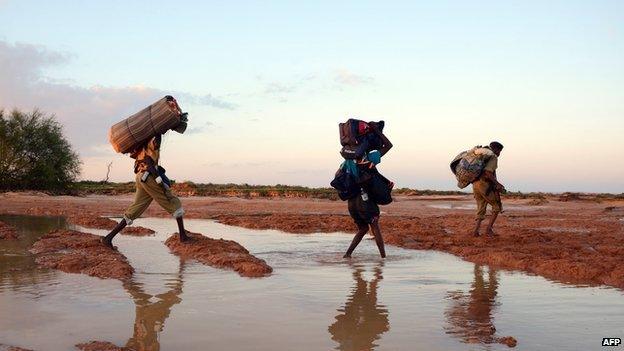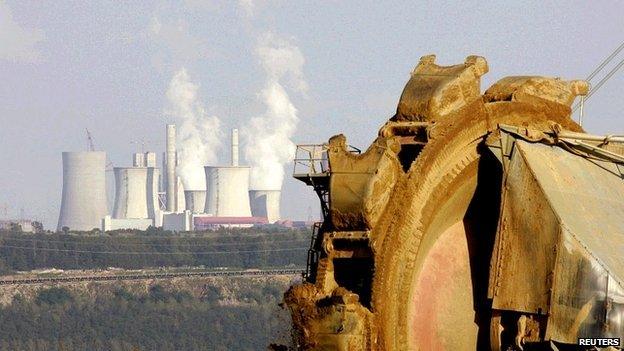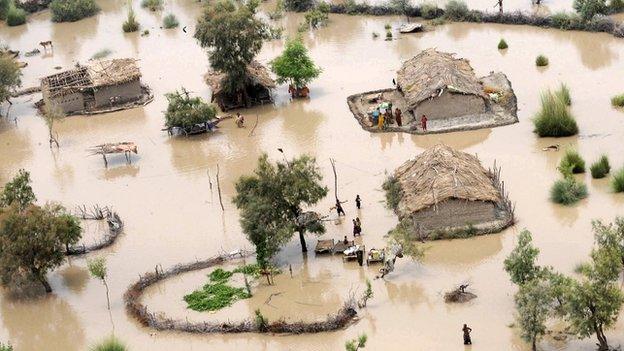IPCC scientists accused of 'marginalising' poor nations
- Published

Some experts believe the current narrative prevents less wealthy nations from developing
Climate scientists meeting in Berlin have been accused of "marginalising" the views of developing countries.
They are preparing to release a key report on how the world must cut carbon emissions to stem dangerous warming.
They are likely to say that if significant action isn't taken by 2030, temperatures will quickly break through the 2 degree C threshold.
But a lead author told BBC News that this focus on cutting CO2 was ignoring the development needs of the poor.
"The narrative, the language, the views of the IPCC still marginalises the developing country perspectives," Dr Chukwumerije Okereke, from Reading University, told BBC News.
Dr Okereke was a lead author on chapter four of the new report, dealing with sustainable development and equity.
He believes that there has been a fundamental shift in the discussions because the issue of historical responsibility for carbon emissions has been watered down by richer nations who are more concerned with the future than the past.
"The argument has been shifting away from the view that the developed countries, who have been mainly responsible for the problem, should take leadership in solving it, to this centre-ground view that we are all in it together and we all have to do our share.
"In effect, this is shifting the burden onto the developing countries and is holding them down from developing; quite frankly this is reinforcing historical patterns of injustice and domination."
In a leaked draft of their report, the IPCC authors write that cumulative emissions of carbon dioxide from 1750 to 1970 were around 900 billion tonnes. But when you measured the emissions between 1750 and 2010 they had soared to 2,000 billion tonnes of CO2.
Further emphasising the recent trend, the draft points out that between 2000 and 2010, emissions grew at 2.2% per year, compared to 1.3% over the period between 1970 and 2000.
To keep temperature rises below 2C, widely accepted as the threshold to dangerous change, carbon emissions in the atmosphere by 2100 have to be between 430 and 480 parts per million (ppm).

Historical responsibilities for global warming remain a bone of contention at the IPCC talks
On current projections, the world would go through the 430ppm by 2030, so the report says that emissions cuts must happen soon.
The report indicates that the majority of future emissions growth will take place in developing countries.
This question of past and future is a big bone of contention between the parties meeting here in Berlin.
"I think one of the big battles is the definition of historical responsibilities and the estimation of it," said Martin Khor, who was a co-ordinating lead author of chapter three of this report but resigned, he says, because of the overwhelming amount of work involved.
"Developed countries are more likely to say, let's look into the future, the future runs from 2005 to 2100, and you will find that a lot of the emissions are coming from developing countries."
Dr Okereke says that a big part of the problem is that there are not enough authors on the IPCC from developing countries.
"This IPCC is a very genuine effort to reflect the underlying science, but in the end it does not fully capture the views from developing countries because the overwhelming majority of the authors are from the developed world.
"They come with loads of secretaries and helpers, they bring their PhD students along, but the few of us from developing countries are not able to match the force of intellectual firepower that comes from them."
Dr Okereke's views on the involvement of authors from developing countries are supported by Martin Khor, who says the lack of representation has serious implications for the tone of the report.
"Most of the accepted literature is published in developed countries and the authors are predominantly western," he says.
"It doesn't mean they are wrong but they don't have that same sympathetic consideration of developing country problems as they are not living in those conditions day to day."
The IPCC said it is working hard to increase the number of authors from the developing world.
"As someone from a developing country myself, this is an issue of which I am well aware," said the Panel's chairman Dr Rajendra Pachauri.
"About 30% of the authors for the Fifth Assessment Report come from developing countries, a share which has gone up with each successive assessment, and I am sure that figure will continue to rise in the years ahead."
Follow Matt on Twitter, external.
- Published31 March 2014

- Published31 March 2014
- Published11 April 2014
